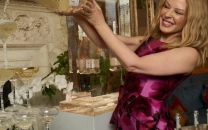Is feminism really that easy?
It should not matter whether Sarah Khan is a feminist

Known for Sabaat and currently starring in Sher, actor Sarah Khan's recent rejection of feminism was delivered with casual ease. "I'm from the old times," she told Independent Urdu. "I'm a stay-at-home woman. I don't like standing in long queues to pay bills."
Among Pakistani actors, it's become almost a ritual to distance themselves from feminism. By doing so, Sarah joins a growing list of celebrities who risk being labelled ungrateful, deluded, brainwashed — or, perhaps most cuttingly, a "pick me."
But set aside, for a moment, the troubling ease with which "pick me" accusations are lobbed at unpopular women. Sarah's remarks might actually be the most honest a celebrity can afford to be. In Pakistan's entertainment industry — and, to varying degrees, far beyond it — any political stance is a liability. But Pakistan's entertainment scene also comes with its own peculiar set of restraints: given the lamentable state of storytelling across its small and big screens, feminism might well spell the end of homegrown cinema and television as we know it.
Could Sarah embrace feminism and still survive in this business? If all the internet demands is a declaration, then there's no expectation that she challenge the industry's tired tropes: marital rape framed as romance, cheating husbands and weeping wives, villainous in-laws on loop. And yet, even those who do claim feminism rarely escape scrutiny. In another timeline, Sarah might call herself a feminist - and still end up like Mahira Khan, defending Humsafar as decidedly feminist.
Unless she waits for a script that aligns with her politics — a patience more feasible for veterans like Sania Saeed than for the younger lot — Sarah, like many, must navigate an industry with few real choices. Celebrities may not be anti-feminist so much as anti-permanence, determined to keep all doors open in a volatile landscape. At this cultural juncture, perhaps it's time to retire the reflexive urge to dismiss them as uninformed or unserious. After all, feminism doesn't require credentials. Or does it?
Of flawed feminists
Of all the accusations hurled at women who reject feminism, "pick me" might be the most accurate - not with derision, but as a simple observation. These women do get picked, or at least, they don't get dropped. It is far easier to be a perfect anti-feminist than to be a flawed feminist.
In 2025, the internet remains the primary venue for these debates. It is many things — chaotic, compulsive, connective — but it is not, by design, a place for dialogue. In lieu of coalition, we get temporary publics that vanish with a single accidental refresh.
Sarah's remarks, unfortunately but unsurprisingly, are rewarded. She earns the approval of many women, even more men, her corporate backers, and, most reliably, the algorithm and its appetite for controversy. In contrast, claiming feminism would likely win her no one - not even feminists. Consider, for instance, the loudly marketed feminism of Priyanka Chopra or Gal Gadot, which always stops short of calling out the genocidal regimes they represent.
This is simply because feminism, unlike celebrity culture, has never been about victories or perfection - both imply a final destination, a tangible reward. But feminism is, and has always been, a long, often grueling project of constructing alternatives. When Sarah says she isn't a feminist because she doesn't like standing in queues to pay bills, it's hard not to smile. Who has ever dreamt of engaging with mind-numbing bureaucracy?
However, to move from personal inconvenience to structural critique — to ask who is forced to endure such banalities and who can afford to opt out — requires a working knowledge of class, capitalism, and economic inequality. Sarah's discomfort is valid. She has two choices: repeat polite, vague affirmations of "women's empowerment" or be honest about what bothers her.
Shorthands without shelter
It can be an uncomfortable realisation, especially for those whose first exposure to feminist politics comes online: the "right" politics is not a moral instinct and in fact, requires labour and access. Harsh realities, too, are not always radicalising, not unless you find others to hold onto.
Isn't this why we extend grace to our mothers? Most would never call themselves feminists, yet we recognise in their lives the slow work of navigating time, access, and patriarchy. This grace comes from understanding that naming something is a privilege; not everyone has the means or the language to do so.
Despite the many ways of practicing feminism, it's language is still a matter of access and cultural capital — online and offline both.
But even the language aside, to suggest that feminism should come naturally — without friction, without labour, without missteps — misses the point of any resistance movement.
At any given moment on the Pakistani internet, someone is explaining, often impatiently, why using the n-word is wrong, why blackface is racist, or why cultural appropriation matters. Frequently, this confidence to correct comes from assuming proximity to discourse equals clarity. God forbid anyone asks why feminism is good or racism is bad. These are no longer merely uncomfortable questions, but bad-faith attacks that feminists are all too tired to answer.
A natural reflex to these presumably futile remarks is to let disappointment or betrayal creep in. It is a good strategy to cope with the bad days. But good days must come bearing patience for an unlearning that takes its sweet time. After all, both vitriol-spewing trolls and young feminists will find us in the same world of shorthands.
In this world, there is no luxury of time and space to write in case you missed it, when ICYMI is an option. We know that Instagram/TikTok reels perform best at under 60 seconds, that X posts are limited to 280 characters, and that long, boring blocks of text belong to Medium or LinkedIn. It is within this sheer compression of context that many find feminism and anti-feminism that come too easily, more as identity than practice. While one can survive being stripped of context and care, the other cannot.
This is why it simply should not matter whether Sarah calls herself a feminist or not. And without doubt, calling Sarah a "pick me" is more damaging than her remarks about feminism. After all, saying "I am a feminist" is just another shorthand unless there is a corresponding space to figure out whatever the hell that means.



















COMMENTS
Comments are moderated and generally will be posted if they are on-topic and not abusive.
For more information, please see our Comments FAQ